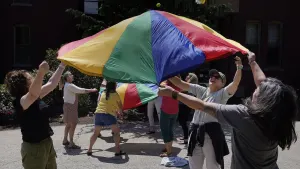More Stories
News 12's Elizabeth Hashagen was joined by Dr. Thomas McGinn this morning to discuss the Johnson & Johnson vaccine pause and virus variants.
A decision about whether to resume administering the Johnson & Johnson COVID-19 vaccine should come this Friday.
The two most likely options are restricting the shot to an age group, such as men and women over 50 years, or allowing a return to widespread use but with an added warning.
While it's true that the virus variants are a significant public health concern, the unrelenting focus on each new variant has created undue alarm and a false impression that vaccines don't protect us against the various variants that continue to emerge.
While it's true that the vaccines have different success rates against different variants, the perception that they don't work against variants at all is incorrect. In fact, the available vaccines have worked remarkably well so far, not just at preventing infection but, most important, at preventing serious illness and hospitalization, even as new variants circulate.
The fact that two vaccines have achieved about 95% efficacy has created unrealistic expectations about what it takes for a vaccine to perform well.
So what's the risk of getting infected after vaccination? Nobody knows for sure, but we have some clues. During the Moderna trial, for instance, only 11 patients out of 15,210 who were vaccinated got infected. Both Pfizer and Moderna now are doing more detailed studies of breakthrough cases among vaccinated trial participants and should be releasing that data soon.
Two real-world studies of vaccinated health care workers, who have a much higher risk of virus exposure than the rest of us, offer hopeful signs. One study found that just four out of 8,121 fully vaccinated employees at the University of Texas Southwestern Medical Center in Dallas became infected.
The other found that only seven out of 14,990 workers at UC San Diego Health and the David Geffen School of Medicine at the University of California, Los Angeles, tested positive two or more weeks after receiving a second dose of either the Pfizer-BioNTech or Moderna vaccines. Both reports were published in the New England Journal of Medicine.
Most important, patients who were infected after vaccination had mild symptoms. Some people had no symptoms at all and were discovered only through testing in studies or as part of their unrelated medical care.
Why might we need a booster shot?
What's the difference between a normal reaction to the vaccine and a reaction that you should be concerned about?
More from News 12
1:28

5 simple steps for long-term benefits to your health and heart
1:32

8 tips for working safely during hot weather
3:31

Guide: Ways to set your child up for financial success
3:18

Guide: The importance of good sleep and how to get it

Guide: Mental health resources available in the tri-state
9:36
